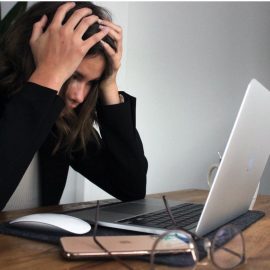

This article is an excerpt from the Shortform book guide to "The Big Leap" by Gay Hendricks. Shortform has the world's best summaries and analyses of books you should be reading.
Like this article? Sign up for a free trial here .
Do you often find yourself criticizing others? How does unvoiced criticism erode your relationships with people?
Being hyper-critical of others is a toxic mental habit. When you criticize others—even if you don’t voice your criticism—you create unnecessary negativity in your interactions with people.
Here’s how criticism damages your relationships and how to stop criticizing others.
Your Criticism of Others Is About You, Not Them
Criticism of others is usually as much, or more, about you as it is about the other person. It keeps you from being able to work harmoniously with others, and puts the blame for failures or problems onto others instead of taking responsibility for those yourself.
Start to observe any critical statements you make about others, and make note of whether those are productive or not. For example, if your co-worker isn’t meeting their obligations and it’s keeping you from accomplishing tasks, notice how you react to it: Are you addressing it in a productive way, or just hurling criticism? Are you placing all of the blame on them without examining your role in the dynamic?
In his book The Big Leap, Gay Hendricks gives some tips on how to stop criticizing others: Once you take notice of your tendency toward criticism, Hendricks suggests trying to refrain entirely from making any critical statements for one day—this should make you aware of how habitual the behavior is. Then, notice whether your criticisms are things you can do something about and, if so, just do what it takes to resolve it. He predicts, however, that you’ll notice that most of your criticisms are not productive, and when you realize this, you’ll become aware of how unnecessary they are and eventually stop the habit.
| How to Know if You’re a Compulsive Criticizer Some psychologists consider hyper-criticism to be the most damaging behavior in relationships, including those with our romantic partners, our friends, our families, and our colleagues. But critical people don’t often tend to recognize that about themselves. It’s believed to be a mechanism for ego-defense, often stemming from being criticized heavily as a child. As the criticized child matures, they’ll tend to project that internal criticism outward in order to remove it from themselves. If you tend to have a lot of conflict in your relationships, you might just be “that person.” Hendricks advises us to take notice of our critical statements, but there are a few specific signs you can look for that may tell you if you’re too critical: 1. People tell you you’re too critical, negative, or judgmental. If you’ve heard this from multiple people, you should probably believe it. 2. You have a hard time letting others do things without interfering and correcting them. 3. Even when others around you are enjoying something, you’ll always find a complaint. You find it difficult to be fully grateful. Noticing these behaviors in yourself is the most important step toward changing them. Once you can catch yourself being critical, you can learn to pause and replace the negative with something positive or neutral. It will take practice, but this is a behavior you can learn to change. |

———End of Preview———
Like what you just read? Read the rest of the world's best book summary and analysis of Gay Hendricks's "The Big Leap" at Shortform .
Here's what you'll find in our full The Big Leap summary :
- How to overcome the psychological barriers to success and fulfillment
- Why most people have a self-imposed limit to happiness
- How to identify your own false beliefs and stop self-sabotaging






